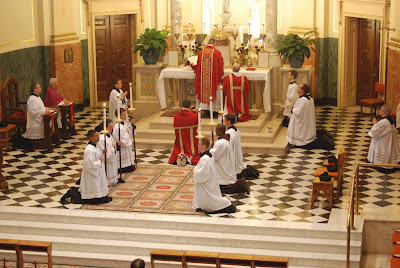
A book which was in my father's library and I suspect in the library of many priests once upon a time was Clarke, W. K. Lowther, and Charles Harris. Liturgy and Worship. SPCK, 1964
[T]he
effect of silence (or of subdued or whispered speech) is to lull the outward
senses into a receptive condition; to induce tranquillity, repose, and inward
peace; to relax the tension of the nervous system; and gradually to induce a
state of restful waiting upon God, which opens the ‘subconscious’ or
‘unconscious’ mind to the influence of grace and religious suggestion. (775)
At
an early but undetermined date, it gradually became customary, both in the East
and in the West, to recite certain of the most solemn Eucharistic prayers,
particularly the greater part of the Canon, in a very low or inaudible voice.
Such recitation was termed ‘mystic’ (mystikos), an epithet which
sufficiently indicated its significance. … It evinced just such an overpowering
sense, not merely of humility, but even of ‘abjection’ and ‘nothingness,’ as
befits a creature admitted to the immediate presence of its Creator. (775)
There are obvious disadvantages, both of a devotional and of an intellectual
kind, in the silent recitation of the Canon or Anaphora. On the other hand, it
can hardly be denied that the ‘mystic’ prayer of the celebrant has been a prime
factor in creating that thrilling atmosphere of rapt adoration which has been
the distinctive feature of Catholic worship throughout the ages; and which the
more intellectual, instructive, and ‘edifying’ worship of modern Protestants
seems unable to evoke. (776)
An atmosphere of mystical awe pervades the
whole of this Liturgy. The worshippers are said to be ‘full of fear and dread’
while they offer ‘this fearful and unbloody sacrifice,’ which is further
described as a ‘fearful and awe-inspiring (phriktēs) ministration.’ After
consecration, the elements are spoken of as ‘hallowed, precious, celestial,
ineffable, stainless, glorious, terrible (phoberon), dreadful (phrikton),
divine (theon).’ (777)
A sense of ‘numinous’ awe pervades this
Liturgy, which speaks of the Mysteries as not only ‘divine, holy, spotless,
immortal, heavenly, and quickening’; but also as ‘tremendous’ or ‘fearful’ (phrikton,
literally ‘to be shuddered at’). (778)
all the ecclesiastical body now
observes silence, and all set themselves to pray earnestly in their hearts. The
Priests are still, and the deacons stand in silence . . . the whole people is
quiet and still, subdued and calm . . . The Mysteries are set in order, the
censers are smoking, the lamps are shining, and the deacons are hovering and brandishing
[fans] in likeness of watchers [i.e., angels]. Deep silence and peaceful calm
settles on that place: it is filled and overflows with brightness and
splendour, beauty and power. (779)
An audible voice need not be a loud
voice. It is possible to obtain the full ‘mystical’ effect of silence by
reciting the Canon in a very low and subdued voice, fully audible to every
careful listener in the church, and yet expressive and suggestive of the
deepest religious awe. It is not desirable, for the sake of one or two
partially deaf persons, to raise the voice, and thus impede the devotion of the
general congregation, which is fostered and augmented by the use of a subdued
tone of voice. (782)

No comments:
Post a Comment